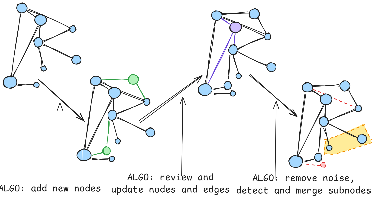
ivan reznikov
Project OwnerProvides comprehensive expertise on large-scale graph network architecture and dynamics. Leads research into graph attention networks (GATs) and their application to knowledge representation
DEEP Connects Bold Ideas to Real World Change and build a better future together.
Coming Soon
Our team is passionate about tackling one of the most critical challenges in AGI development: creating robust, reliable knowledge graphs that can truly support advanced reasoning. We're proposing a comprehensive set of tools and techniques to refine, extract, and benchmark knowledge graphs designed for AGI systems. What excites us most is the potential impact on scalability, noise reduction, and evaluation in neuro-symbolic AI frameworks - with particular attention to compatibility with OpenCog Hyperon, including MeTTa and MORK.
This RFP seeks the development of advanced tools and techniques for interfacing with, refining, and evaluating knowledge graphs that support reasoning in AGI systems. Projects may target any part of the graph lifecycle — from extraction to refinement to benchmarking — and should optionally support symbolic reasoning within the OpenCog Hyperon framework, including compatibility with the MeTTa language and MORK knowledge graph. Bids are expected to range from $10,000 - $200,000.
The first milestone will deliver a functional prototype of our noise reduction framework for knowledge graphs. This framework will implement our novel approach that leverages LLM-based noise detection combined with knowledge distillation techniques to identify and remove redundant or low-value nodes. The prototype will demonstrate significant improvements in graph quality while maintaining essential information integrity across multiple test datasets.
- A working prototype implementation of the noise reduction framework with documented API - Technical report detailing the architecture algorithms and comparative analysis against TF-IDF spectral sparsification approaches and other - Demonstration of the framework on at least two distinct knowledge graph datasets with varying characteristics
$30,000 USD
The framework will achieve 10-15+% reduction in graph size while maintaining 95% or higher accuracy on standard knowledge graph completion tasks compared to the original graph. Performance metrics will be documented across multiple domains to demonstrate domain-agnosticity.
This milestone focuses on developing a domain-agnostic entity and relationship extraction system capable of forming hierarchies from flat lists and graphs or transforming flat textual data into rich ontological structures. The system will incorporate advanced Named Entity Recognition semantic relationship classification and other techniques to identify complex relationships between entities. We will develop methods to assign confidence scores to extracted relationships enabling probabilistic reasoning over the knowledge graph.
- A deployable entity and relationship extraction system with comprehensive documentation - Evaluation report comparing our system against state-of-the-art extraction methods
$25,000 USD
The system will demonstrate the ability to extract entities and relationships across at least several distinct domains with F1 scores exceeding current state-of-the-art methods. The system will successfully assign meaningful confidence scores that correlate with human judgment.
We will develop a comprehensive benchmark suite for evaluating knowledge graph quality specifically designed for retrieval and reasoning tasks. This suite will measure multiple dimensions including query latency answer quality path interpretability and robustness to noise. The benchmark will include complex reasoning tasks that go beyond simple factual queries to assess reasoning capabilities more relevant to AGI systems.
- Open-source benchmark suite with documentation and easy setup process - Dataset collection spanning multiple domains for standardized evaluation - Draft of a methodology paper describing benchmark design principles and evaluation metrics
$22,500 USD
The benchmark will successfully differentiate performance between various knowledge graph approaches on complex reasoning tasks with statistical significance.
This milestone will deliver integration capabilities between our knowledge graph technologies and MeTTa and MORK compatible with the Hyperon framework.
- Integration libraries for connecting our knowledge graph tools with MeTTa and Hyperon - Example applications demonstrating end-to-end reasoning capabilities - Performance analysis comparing reasoning tasks before and after knowledge graph refinement
$10,000 USD
The integration will enable faster query processing on complex reasoning tasks compared to unrefined knowledge graphs. We will demonstrate successful multi-hop reasoning on at least three use cases that were previously intractable due to knowledge graph noise or inefficiency.
Reviews & Ratings
Please create account or login to write a review and rate.
Check back later by refreshing the page.
© 2025 Deep Funding
Join the Discussion (0)
Please create account or login to post comments.